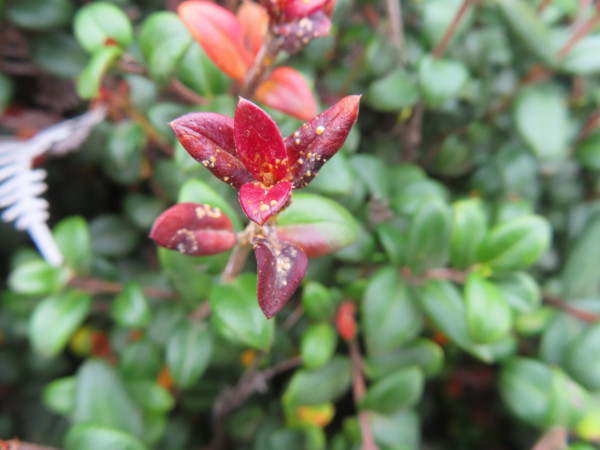Myrtle rust on the Chatham Islands
In late March, myrtle rust was discovered on the Chatham Islands. It’s a minute spore dispersed by the wind or by touch and likely travelled here on the wind from New Zealand.
It was discovered in Taupeka and has already spread to an area of at least 50km² in the north of Chatham Island.
How does Myrtle rust affect plants?
Myrtle rust infects plants from the Myrtaceae family, like pōhutukawa and the exotic Chilean guava/cranberry. The disease attacks new growth (like leaves, stems, flowers, and fruit) and, in extreme cases, may kill the plant.
How can I identify Myrtle rust?
You might see bright yellow powdery spots on leaves, or sometimes brown/grey rust pustules or grey 'fuzzy' spore growth. Some leaves may become buckled or twisted and die off.

Image by Lloyd Esler (CC-BY-NC)
What plants does Myrtle rust impact?
Thankfully, there are no plants endemic to the Chatham Islands that myrtle rust will impact. It may however affect some New Zealand introduced or exotic plants, including:
- Pōhutukawa
- Eucalyptus
- Feijoa trees
- Mānuka
- Rātā
- Kānuka
The good news is that it may help control the highly invasive Chilean guava, which is a plant pest that has negatively impacted many land owners as well as our sensitive marsh ecosystems.
What can I do?
There is no cure for myrtle rust and, because it is spread by the wind, it will likely continue to spread. If you spot it, report it on iNaturalist(external link) so we can track how it’s spreading.
There are a few things you can do to slow the spread of the disease:
- If you have Myrtaceae in your garden, using a fungicide may keep the disease at bay. These should be used sparingly and can only help reduce infection, rather than cure the plant.
- Minimise the risk of spreading the rust by ensuring your equipment, clothing, and tools are clean before you enter forested areas, and clean them again before you leave.
- Try to remove infected material on wet days and avoid dealing with it on windy days.
- Dispose of infected plant waste by composting or burying at the site if you have an appropriate place to do so. Do not burn infected plant waste as the spores will travel and spread to new areas with the smoke.
- Avoid heavy pruning during warm weather as this will encourage susceptible new growth. Instead, prune myrtles only in late autumn and early winter.
- Regularly monitor myrtle plants for any sign of myrtle rust, particularly new, young growth, shoots, and seedlings.
For more information contact kerri.moir@ecan.govt.nz or visit myrtlerust.org.nz(external link) or doc.govt.nz/myrtle-rust(external link)
